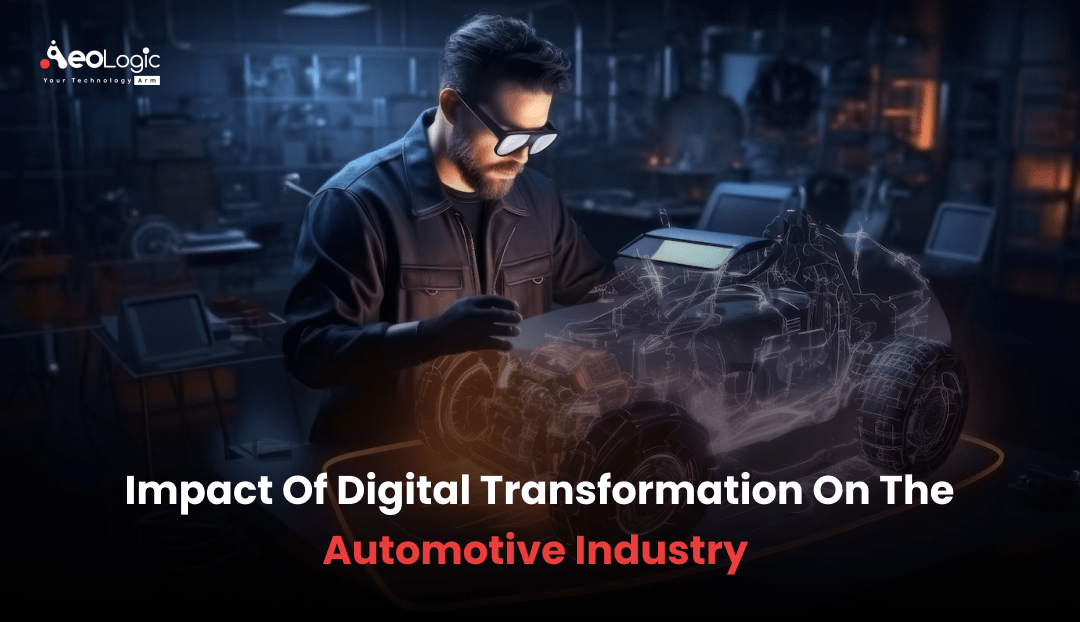Digital transformation in the automotive industry is reshaping conventional business approaches and augments industry capabilities. Uniting advanced technologies and automotive engineering boosts the development of data driven results and connected systems with bettered functional edge. Automotive companies embrace digital transformation to optimize manufacturing processes, upgrade supply chain operation, and review user experience. In this composition, you’ll learn the benefits and impact of digital transformation on the automotive industry, its use cases, challenges for businesses, and crucial trends.
Also read: Role Of Artificial Intelligence In Digital Transformation
What’s the Impact of Digital Transformation in the Automotive Industry?
The impact of digital transformation in the automotive industry helps manufacturers to change their business processes, ameliorate supply chain, enhance product, and increase passenger and vehicle safety. Embracing digital transformation, automotive companies can keep leading positions in the market and attract new clients. Lately, battery prices have declined, which means that automotive associations can increase the product of electric vehicles, completely adopting digital transformation.
Electric buses are becoming more popular, and more investors are willing to support this trend. Researchers prognosticate that by 2040, electric vehicle sales will outgrow diesel and gasoline auto sales.
Benefits of Automotive Digital Transformation
The impact of digital transformation within the automotive industry is enhancing functional effectiveness, boosting invention, and enabling the development of smart and connected vehicles. The perpetration of digital transformation optimizes manufacturing processes and revolutionizes the driving experience through similar results as advanced driver assistance systems (ADAS) and infotainment systems. Digital transformation plays a vital part in meeting evolving consumer demands, contributing to sustainable development, and staying competitive in a fleetly changing market. Following are a few main advantages automotive companies will gain from the digital transformation of their businesses and manufacturing operations.
Online Presence
Establishing an online presence for automotive results boosts broader outreach for retailers. In today’s digital period, the majority of clients can be set up online. Employing the right tools and strategies to connect with a vast online audience will bring increased attention to your product and, therefore, business growth. Note that 70 percent of vehicle owners start vehicle shopping online rather than dealerships.
Bettered Client Experience
More and more automotive companies integrate built in connectivity and infotainment systems into their vehicles, enhancing the overall in car experience for end users. Nearly nine out of ten connectivity auto owners are satisfied with using similar features as voice actuated control, vehicle connection to the Internet, mobile apps for cars, and in vehicle virtual personal assistants.
Better Product Quality
With innovative automated product systems, manufacturers are more likely to notice any quality diversions during the manufacturing process due to simplified real time data collection. These systems also help avoid retrievals and huge financial losses.
Automated Routine Tasks
While transforming business, manufacturers can integrate real time data monitoring and analysis to enhance resource application and increase productivity. With the impact of digital transformation in the automotive industry, they can help workers help equipment failures and minimize any health pitfalls connected to product.
Supply Chain Optimization
By enforcing technologies that perform analysis of large datasets, manufacturers will identify patterns and trends. Using predictive analytics helps to anticipate demand oscillations, optimize supply situations, and enhance product planning, minimizing the threat of overstocking or stockouts.
This way, businesses will get a streamlined and error-free product line. Another way digital transformation can help optimize supply chains is by covering supplier quality with AI. For case, Porsche, Audi, and Volkswagen implement an AI solution that collects public news written in more than 50 languages. This solution identifies whether suppliers violate any sustainability regulations, which helps automotive companies choose the best partners.
Digital Transformation Use Cases in the Automotive Industry
Some automotive companies have formerly embraced digital transformation to gain a competitive edge. Read below to learn how manufacturers apply ultramodern technologies to make further successful businesses.
Autonomous Driving
The product of independent vehicles is anticipated to increase globally. The experts prognosticate market growth to roughly $ 62 billion in 2026. Enabling vehicles to navigate autonomously and easing a hands-free approach for drivers to painlessly reach their destinations was especially successful for Tesla. Their independent vehicles caused a shift in the market, and multitudinous manufacturers followed their illustration, including Mercedes- Benz, Nissan, and Toyota. Despite all the buzz around self driving cars, there have been lots of cases of automated self driving cars, creating business issues.
AI Enabled Auto Design
Digital transformation in automotive manufacturing enables businesses to work AI for new model designs. Using machine learning, manufacturers collect historical data from former models. AI algorithms dissect it to give perceptive recommendations for upgrading designs. Lately, manufacturers started to use ML models. In order to produce new designs and prognosticate their attractiveness to clients. Since an enhanced aesthetics of the vehicle design increases deals by 30 percent. This way, manufacturers reduce costs spent on design creation.
Predictive Car Maintenance
The operation of AI algorithms for vehicle conservation through real time data analysis will change the automotive assiduity. By tracking the current performance criteria of the vehicle, manufacturers can identify and help implicit issues. Predictive vehicle conservation gains momentum in race cars. Manufacturers integrate it into sports cars to dissect their performance and help avoid collisions during the race. Auto conservation technology will more likely be integrated into other vehicles after manufacturers check its full eventuality on the racing field.
Also read: Role of Digital Transformation in Automotive Industry
Wrap Up..
Presently, digital transformation is becoming a must have in a number of sectors. Still, the automotive sector is one of the fastest growing and most complex to transfigure. Vehicle manufacturers need to change their business operation practices and product processes. To stay competitive, they need to consider robotics as a part of business robotization. And integrate AI solutions not only in vehicles but also in manufacturing operations. Similar variations can be grueling and bear competent and skillful masterminds who can help automotive companies ameliorate.







